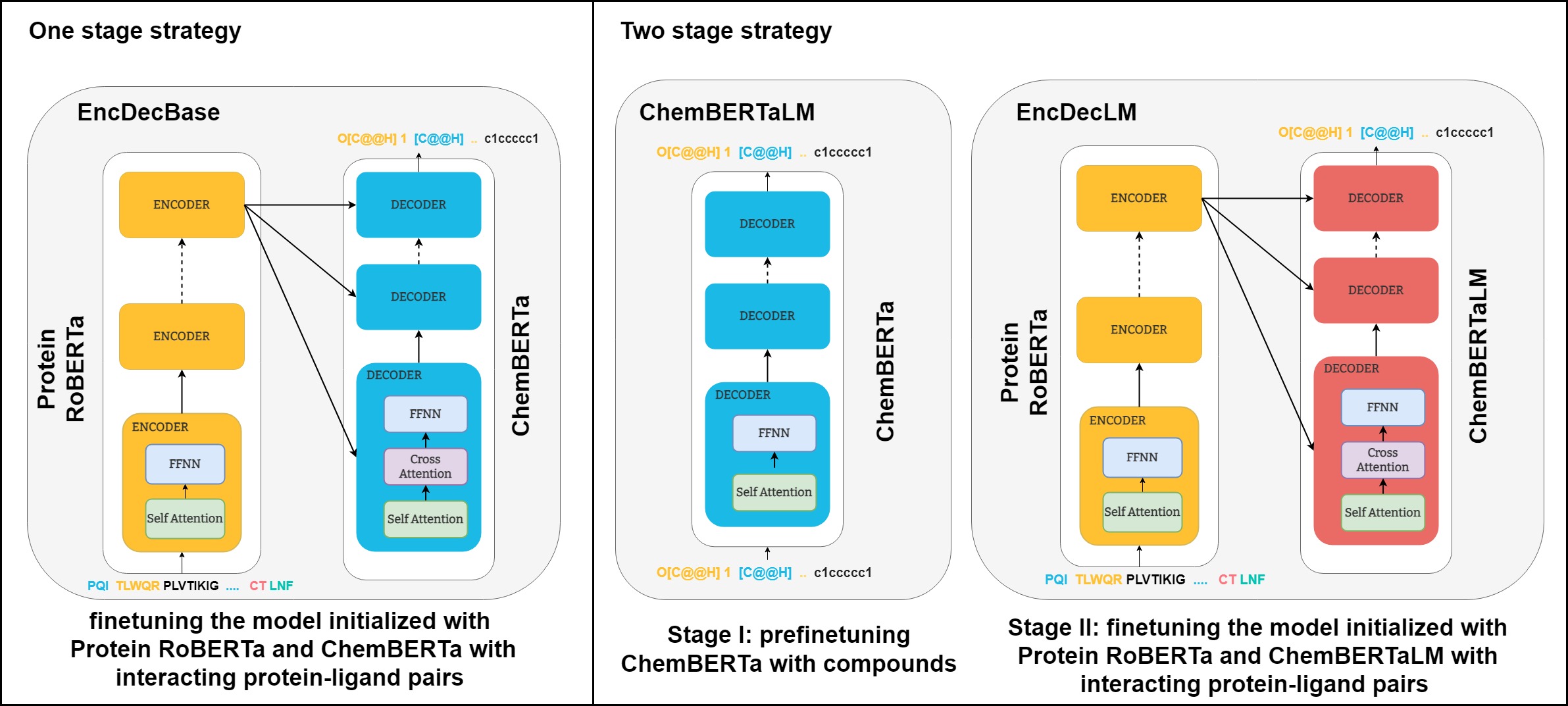This repository contains code for "Exploiting Pretrained Biochemical Language Models for Targeted Drug Design", to appear in Bioinformatics, Proceedings of ECCB2022. The accompanying materials are available in Zenodo
Install the required packages with pip:
pip install -r requirements.txtTo train ChemBERTaLM model, first save MOSES data splits on disk with the following command:
python src/data/download_moses_data.pyThen, train the model with the script below:
python src/molecular_training.py --model_name_or_path seyonec/PubChem10M_SMILES_BPE_450k \
--evaluation_strategy epoch --train_file data/moses/train.txt --validation_file data/moses/test.txt \
--do_train --do_eval --output_dir models/ChemBERTaLM --block_size 256 --save_strategy epoch --num_train_epochs 10Once training is completed, sample 30K molecules from ChemBERTaLM and benchmark it against MOSES
python src/molecular_generation.py --model models/ChemBERTaLM --num_return_sequences 30000 --do_sample
python src/molecular_evaluation.py --model models/ChemBERTaLMTraining target specific models require protein-ligand interactions from BindingDB. Data must be first prepared by following instructions described in notebooks/ or downloaded from corresponding Zenodo repository
Targeted generative models can be then finetuned with initializing from ProteinRoBERTa and ChemBERTa variants (ChemBERTaLM or the original ChemBERTa)
python src/targeted_training.py --output_dir models/EncDecLM \
--protein_model ProteinRoBERTa --ligand_model ChemBERTaLM \
--num_train_epochs 10The baseline model T5 can be trained from scratch with the following snippet:
python src/targeted_training.py --output_dir models/T5 --num_train_epochs 20After training, molecules targeting validation and test proteins can be generated by specifying the trained model path:
python src/targeted_generation.py --model models/EncDecLMNext, benchmarking metrics can be computed as follows:
python src/targeted_evaluation.py --model models/EncDecLMGenerated molecules can be further evaluated with performing docking. This requires installation of additional packages: OpenBabel, PyMol and gnina. OpenBabel and PyMol can be downloaded by conda & pip package managers as follows:
conda install -c openbabel openbabel
conda install -c schrodinger pymol-bundle
pip install py3DmolTo install gnina, please refer to the official documentation.
To perform docking for a protein of interest, its 3D structure in complex with a ligand is needed. Such structures can be chosen from PDB.
To dock a protein whose structure is already defined against a set of molecules, you can execute the command below by giving UniProt ID of the protein and the path of the sdf file storing molecules:
python src/run_docking.py --uniprot_id {protein_uniprot_id} --mol_file {path_to_sdf}One can also provide PDB ID of a protein structure and ID of the ligand in complex with that protein instead of UniProt ID:
python src/run_docking.py --target_pdb_id {PDB_ID} --ligand_id {ligand_ID} --mol_file {path_to_sdf}@article{10.1093/bioinformatics/btac482,
author = {Uludoğan, Gökçe and Ozkirimli, Elif and Ulgen, Kutlu O and Karalı, Nilgün and Özgür, Arzucan},
title = "{Exploiting pretrained biochemical language models for targeted drug design}",
journal = {Bioinformatics},
volume = {38},
number = {Supplement_2},
pages = {ii155-ii161},
year = {2022},
doi = {10.1093/bioinformatics/btac482},
url = {https://doi.org/10.1093/bioinformatics/btac482},
}
